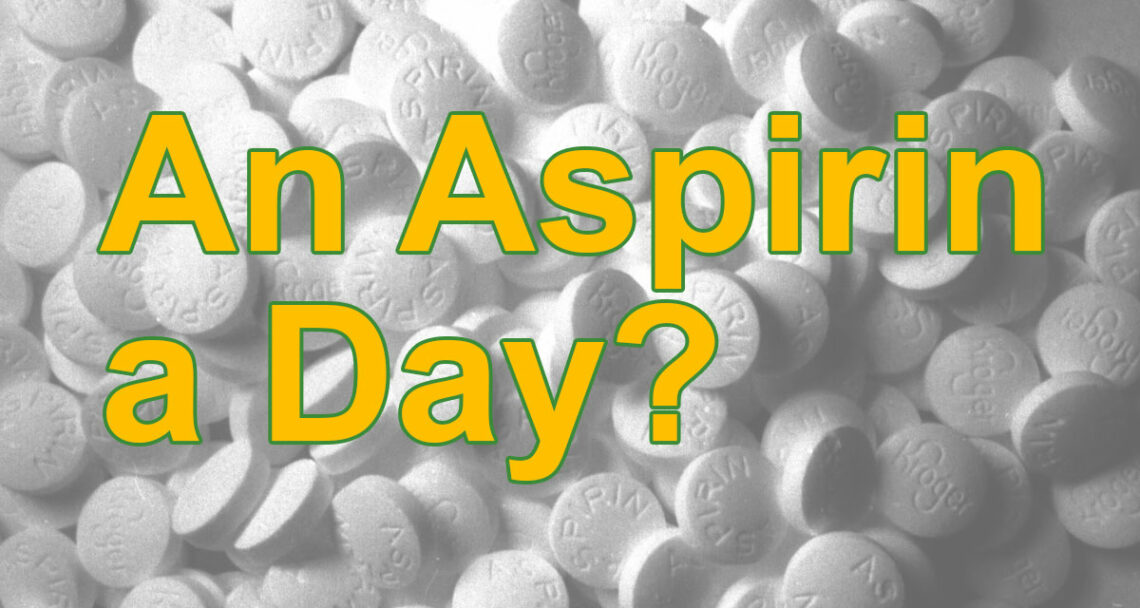Taking an aspirin a day helps to prevent cardiovascular events due to the way it thins the blood. In general, it may be recommended by doctors for those 50 – 70 with risk of cardiovascular disease to take a low dosage of aspirin a day. However, for most other people the bleeding risks are likely to outweigh the benefits.
An Aspirin a Day Reduces the Risk of Heart Attacks and Strokes fact

The Benefits and Risks of an Asprin a Day
Studies show that taking a low dose of aspirin a day can help prevent cardiovascular events like a heart attack or stroke and have other benefits. However, other studies have shown aspirin to increase the risk of bleeding, especially in the stomach.[1][2][3][4][5]
TIP: Always consult a doctor before making changes to a medication or making choices about your health. It can be dangerous to stop taking aspirin for some people, for example, if you have a history of cardiovascular events. We are a fact-checking site looking into the “aspirin-a-day” factoid. Please don’t take the contents of this page as medical advice. The articles we used for research can be found below.
Should I Take an Aspirin a Day?
The above begs the question, is the common claim that one should take a low dose of aspirin a day correct?
The answer to that is a little complicated. Basically, for people 50 – 70 years old who are at risk of cardiovascular disease but have no history of bleeding problems, the benefits are generally thought to outweigh the risks. While people who are low risk, who have a history of bleeding problems, or who are under 50 may have more risk in terms of bleeding than they have to gain in terms of protecting against cardiac events.
FACT: According to WebMD, “Newer evidence indicates that aspirin can also reduce the risk of cancer of the colon, esophagus, stomach, rectum, and prostate. And most recently, the humble aspirin has offered the tantalizing possibility that it may help protect against Alzheimer’s disease.”
Why Does Asprin Help Against Cardiovascular Events and Cause Bleeding?
One reason aspirin can both help prevent cardiovascular events like a heart attack or stroke and can increase the risk of bleeding for that same reason, aspirin thins the blood.
Because aspirin thins the blood, it helps to prevent blood clots, the main cause of heart attacks and strokes, from forming.
- If a blood clot blocks a blood vessel that feeds the heart, it can cause a heart attack.
- If a blood clot blocks a blood vessel that feeds the brain, it can cause a stroke.
So, preventing blood clots is good!
However, on the flip side of this, thinning your blood means (unsurprisingly) a higher risk of bleeding. Bleeding is most common in the gastrointestinal tract where aspirin is processed, but it can occur in other parts of the body as well. Here it is mostly just thinning of the blood that is an issue, but also, for some people, it can be that, mixed with an irritation of the gastrointestinal tract caused by aspirin as well.
Obviously, internal bleeding is not good.
Simply put then, there are risks and benefits that should be considered with the help of a doctor.
TIP: Keep in mind there are other ways of preventing cardiovascular events, such as statins.
- Aspirin and Heart Disease. Heart.Org.
- A major change for daily aspirin therapy. Health.Harvard.Edu.
- Daily Aspirin Therapy: The Benefits And Risks. HenryFord.com.
- Should You Take a Low Dose Aspirin Every Day?. Healthline.com.
- Effect of low‐dose aspirin on health outcomes: An umbrella review of systematic reviews and meta‐analyses. bpspubs.onlinelibrary.wiley.com.
